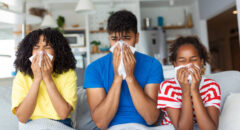
In December 2020, a new variant of the coronavirus that causes COVID-19 was reported in the news media, and since then, other variants have been identified. The new variants raise questions: Is the coronavirus more contagious now? Will the vaccines still work? Are there new or different things you should do now to keep your family safe?
Variants of viruses occur when there is a change (mutation) to the virus’s genes. The nature of RNA viruses such as the coronavirus is to evolve and change gradually. Mutations in viruses — including the coronavirus causing the COVID-19 pandemic — are neither new nor unexpected. All RNA viruses mutate over time, some more than others.
Flu viruses change often, which is why doctors recommend that you get a new flu vaccine every year.
Multiple variants of the SARS-CoV-2 coronavirus that are different from the version first detected in China are being seen. One mutated version of the coronavirus was detected in southeastern England in September 2020.
That variant, now known as B.1.1.7, quickly became the most common version of the coronavirus in the United Kingdom, accounting for about 60% of new COVID-19 cases in December. Other variants have emerged in South Africa, Brazil, California, and other areas.
There are 17 genetic changes in the B.1.1.7 variant from England with some preliminary evidence that it is more contagious. Scientists noticed a surge of cases in areas where the new strain appeared. Some of the mutations in the B.1.1.7 version seem to affect the coronavirus’s spike protein, which covers the outer coating of SARS-CoV-2 and gives the virus its characteristic spiny appearance. These proteins help the virus attach to human cells in the nose, lungs, and other areas of the body, causing COVID-19 illness. This mutation may cause the virus to attach itself more securely than the prior version.
However, thus far, the news is somewhat reassuring. Although mutations may enable the coronavirus to spread faster from person to person, and more infections can result in more people getting very sick, overall, there is not yet clear evidence that any of these variants are more likely to cause severe disease or death.
One of the main concerns is whether any of the variants could affect treatment and prevention. Mutations may allow the coronaviruses to escape the antibodies in currently available therapies and those induced by vaccines. More data is needed to investigate this possibility.








